UPDATE: This post was originally published in 2015. For a more recent look at how my readers’ habits have changed since then, check out my 2017 Social Media Survey Results.
Ever stop in the middle of doing something you always do and ask yourself, “wait… WHY am I doing this again?”
That’s what I started wondering about social media.
Last year, I took a four month break from Facebook, Twitter, Instagram, and everything else. It was like a digital detox. I wanted to see what else I’d have time for if I wasn’t spending hours on those social channels every day.
While my life didn’t change dramatically, I will admit that I was calmer and happier when I spent less time online.
When I started using those channels again, I tried to ease back into them slowly. Having been offline for awhile, the act of social sharing didn’t seem necessary anymore. I told myself, if I was going to take the time and effort to share something, I wanted it to be “worth it” — both to my audience and to me.
But it didn’t take long until I was sharing regularly again, across all the same channels as before. Once the floodgates of real-time feedback — and the desire for ever more interaction — open, it’s hard to restrict them. I went from only sharing things I felt were important to once again sharing things just for the sake of having something to say, or to see who’d respond.
That’s when I wondered: what do we expect from this experience?
Would we be better at it if we admitted what we wanted from it?
Is what I expect different from what you expect?
So I made a short survey of our social media habits, and I shared it on Facebook, Twitter, and LinkedIn. I saved the response data at the survey’s midpoint (51 respondents), and again in the end (93 respondents), because I stopped sharing the survey on Facebook after the midpoint, so I presumed the rise of Twitter-driven responses might skew the data.
The respondents were 60% female (55 women, 37 men).
Half of them (46) are between 31 and 40 years old. A third (32) are over 40. The rest (15) are between ages 18 and 30.
I didn’t pay to promote the poll; I just shared it with my audience on these channels, so all respondents are probably either people I know or friends of friends. While that’s not a deep or varied pool, it’s interesting to see how many answers definitely stand out, even in this limited data set.
Below are the questions and answers, followed by my takeaways.
People most enjoy the channel they use most often. When only 51 respondents had answered this question, Facebook had a slight lead over Twitter in terms of overall responses. But because I mentioned this survey only twice on Facebook vs. half a dozen times on Twitter, regular Twitter users (and lovers) eventually outpaced Facebook lovers.
FUN FACT:
LinkedIn received zero votes for most enjoyable channel.
This one actually surprised me. Even though LinkedIn is built for professionals, and even though Facebook would seem to be a better experience for business, Twitter was always the leader in this category, even when only 51 people (including a greater percentage of Facebook lovers) had answered.
FUN FACT:
Google Plus received zero votes for most important professional channel.
People share personal experiences more often than they share anything else on social media. Beyond that, things got interesting.
When 51 people had taken this survey, Humor and Personal Experiences were neck-and-neck in the results, both at over 50%. But as the Twitter users gradually outnumbered the Facebook users, Humor fell below 40% as News, Inspiration, and “Insights Related to My Hobbies and Interests” rose.
This would seem to support the view that Facebook is used more often for casual conversation, while Twitter is used more often for networking and professional brand management… but we’ll revisit that idea in a few more questions.
FUN FACT:
According to this survey, Twitter users are more likely to share “Opinions I Disagree With” than Facebook users are.
Most respondents to this survey keep their Facebook friend counts low. This is interesting, because a recent Facebook post by social media guru Robert Scoble proclaimed “people with fewer than 400 Facebook friends almost always are crappy at Facebook” — by which he means the people who share too many baby pictures and not enough meaningful (to him) content.
This gets at the core difference between people who use Facebook as a brand-building platform — which leads to thousands of “friends” — and using it as an interpersonal platform built mostly of the people you know well.
Having a large Twitter presence doesn’t correlate to also having a large Facebook presence, and vice versa. This may be due to Facebook’s seemingly more personal nature. What (and why) we share on Twitter may differ from what (and why) we share on Facebook.
Or, to put it another way: just because you hope 1000 strangers will read your latest blog post, that doesn’t mean you want those same 1000 people to see every photo of your kids.
FUN FACT:
More respondents “don’t use Twitter” than “don’t use Facebook.” This would imply that respondents prefer interactions with people they know than with people they don’t, even if the volume of those interactions is smaller.
LESSON:
People online hope to be seen as Interesting, Funny, and Enjoyable. While those were always the 3 most popular answers to the survey, the way the volume of answers changed as more Twitter users took the survey is somewhat telling.
Interesting, Funny, Exciting, and Talented actually went down over time. What went up? Smart, Helpful, and Trustworthy. To me, that’s consistent with the view of Twitter users as being more interested in their professional appearance, while Facebook users are more likely to seek emotional feedback.
FUN FACT:
Not a single person chose “attractive,” selfies be damned.
Which brings us to the key question…
 This was an essay question, so users could put their goals into their own words. What I wondered was: do our expected outcomes from our social media actions match our results? Or is there a disconnect between what we hope for and what we get in the end?
This was an essay question, so users could put their goals into their own words. What I wondered was: do our expected outcomes from our social media actions match our results? Or is there a disconnect between what we hope for and what we get in the end?
In reviewing their answers, here are the words and sentiments that respondents repeated most often:
- Share: 32
- Enjoy: 26
- Enlighten / Help / Learn: 26
- Comment / Converse / Reply / Respond: 22
- Read / Watch: 14
- Appreciate / Favorite / Like: 13
- Amuse / Entertain / Laugh / Smile: 13
- Think: 12
LESSONS:
More than anything else, people want what they post socially to be shared. They want to know that what they’ve created is relevant enough to someone else that it gets shared with people who would never have seen it otherwise, so it can take on a life of its own. (This explains most respondents’ desires to be seen as “Interesting.”)
Beyond that, comments and responses are worth more than a like or a share — but anything is better than nothing. The number of people who specifically said they wanted others to read what they share is noteworthy. In a world of ever-increasing distractions, we’re desperate to be seen, noticed, and heard, just to prove we really do exist.
And while lots of people hoped to educate, enlighten, or get people to think differently, the majority of respondents want to create or share media that others will enjoy. While information is important, we mostly use social networks to help each other feel better.
OTHER ANSWERS:
“Laugh. Also, share their opinions back with me, keep an informal dialogue going. I intentionally follow people whose opinions are different or at odds with my own. Keeps me from living in a like-minded bubble and opens me up to a broader world-view.”
“Comment on it. Share it. Anything but just like it, star it, or RT it. I like words.”
“Think more objectively about how they react/interact with people in any social situation, digital or otherwise.”
“Vote out the mayor.”
“Drink better beer.”
What About Me?
Good question.
(And no, I didn’t take my own survey.)
I often think about my audience vs. my intentions, and whether I’m actually providing value to anyone else, much less to myself.
At the moment, social media is a larger part of my daily human interaction than I’d like it to be. (This is what happens when I freelance, and Twitter and Facebook become my virtual water cooler, happy hour, and nightclub all at once.) I use social media personally and professionally, and the two often intermix. This leads me to some gut-check moments, like…
“Should I share or say this?”
“Do I need to share or say this?”
“Does anyone else need to see or hear it?”
“How will people view me differently if I share or say this?”
(Not that this always stops me, as my Twitter followers know. But if you knew how many updates I type out but delete before sending, you’d be amazed.)
Now that I’ve had time to digest everyone else’s answers to my survey, I think it’s time to consider my own social media habits, and figure out if they’re creating the results I want.
What about you? Is your social media use giving you what you need?
If You Like This Post
… then you may also enjoy this post about how to improve your online sales, or this post about how to host a successful webinar.
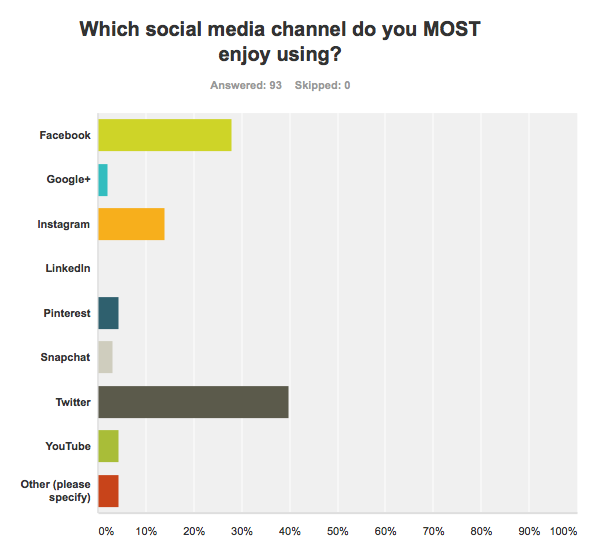
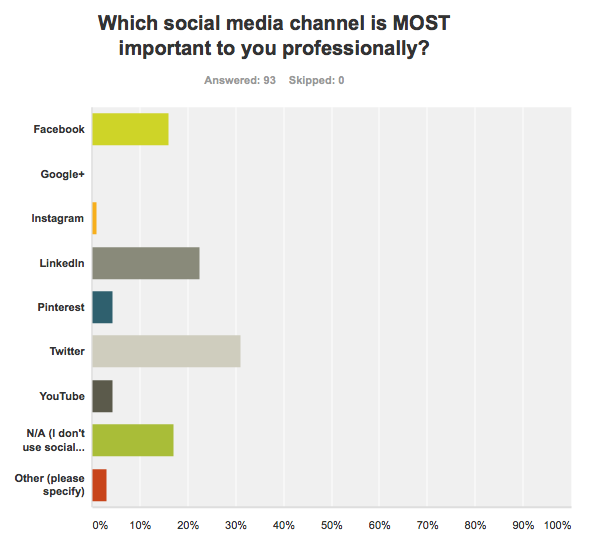

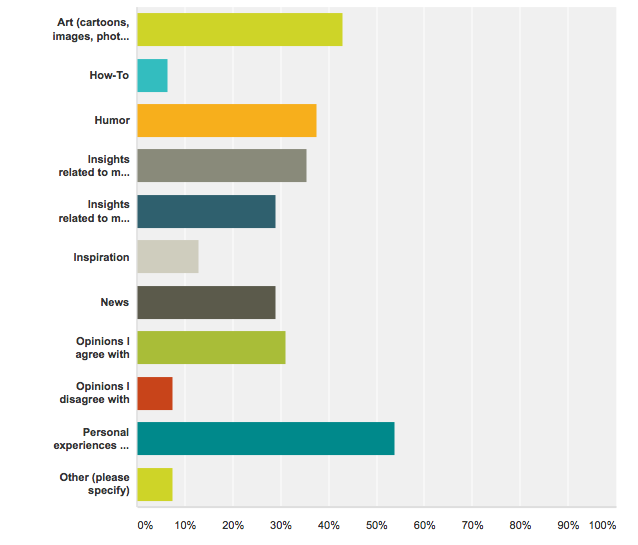
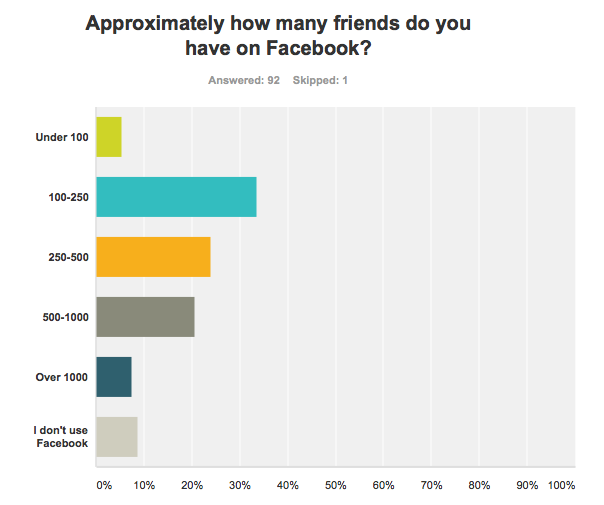
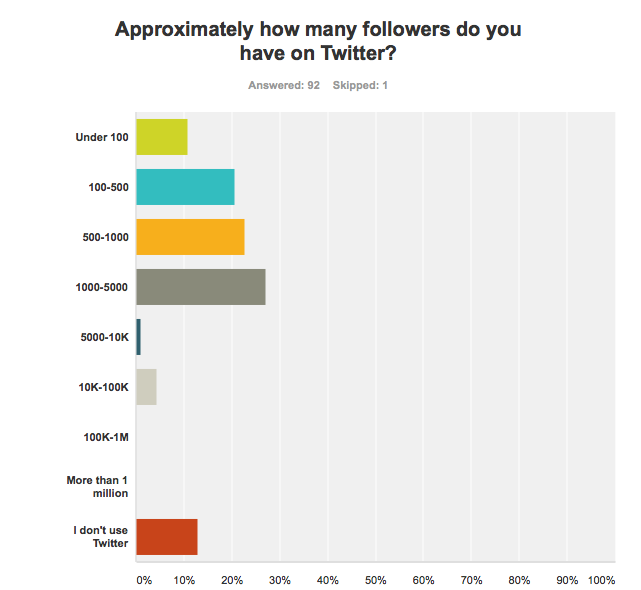

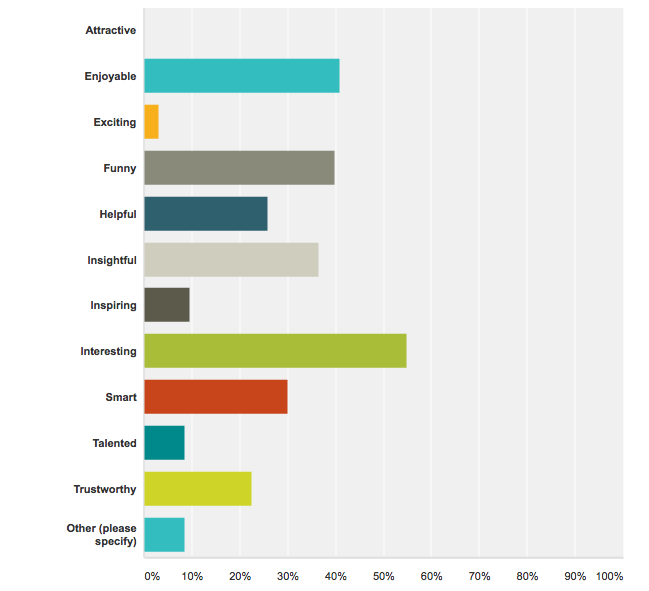



3 Comments
Mark Tisdale · June 1, 2015 at 7:41 am
Interesting results. Thank you for sharing the data and providing some commentary about it. I also believe that using Facebook is best for close friends and family and Twitter for more varied connections in life. I have been trying to incorporate more of a wider connection base in Facebook but always find myself pulling back…odd at this stage of the digital share ecosystem but that is my bias. I have worked hard at G+ but have not seen much return there other than my connections to boardgamers (big audience there) and more things nerd (Walking Dead, ST, SW, comics, fantasy art etc). G+ has turned into my digital equivalent of that weird head shop that sells cool Frazetta posters. I think there is a big opportunity for a better professional network beyond LI…just what that is and how you could get people to sign up to use it….BIG question that needs answered.
Justin Kownacki · June 1, 2015 at 11:50 am
Thanks, Mark. Personally, I never saw a need for G+ when I was already spending time on so many other networks. It always seemed like an answer to a question no one was asking. But if certain groups are seeing value in it, rock on.
As for a better pro network than LinkedIn, the need is certainly there. It’ll probably be designed by a Millennial, though. It would almost have to come from someone thinking completely outside the box compared what’s already there; a vague improvement just wouldn’t do it. LinkedIn is “good enough” for most of us, so — like G+ — we’d need a major reason to change over to something new.
Would You Rather Be Interesting or Popular? | Justin Kownacki · June 4, 2015 at 12:05 am
[…] SURVEY RESULTS: How and Why Do We Use Social Media? […]